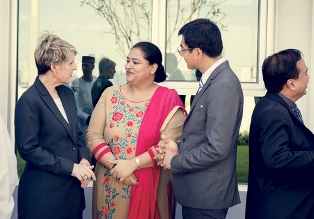How the Patient Voice is Shaping the Conversation in Global Approaches to Health

By Bret Denning, JD, COPD Foundation Care Delivery and Communications Program Specialist
In 2018, Pfizer hosted a luncheon briefing, Global Trends in Health Care, with an emphasis on the role patients and patient-led organizations can play in influencing policy.
Moderated by Angela Wasussa, Vice President of Global Policy at Pfizer, the panel featured renowned experts from around the world. The presenters were:
- Durhane Wong-Rieger, President & CEO, Institute for Optimizing Health Outcomes from Canada.
- Eva Maria Ruiz de Castilla, Director for Latin America, Global Alliance for Patient Access (GAFPA) from Peru.
- Regina Kamoga, Executive Director, Community Health and Information Network (CHAIN) from Uganda.
The discussion began with an open question to the speakers, asking, “what is patient-centered healthcare and what are the benefits of such an approach?” All three speakers emphasized the importance of giving patients an active voice in their care and the ability to advocate on their own behalf. On a larger scale, patient-centered healthcare can refer to the active role patients take in advocacy efforts for more research or treatment solutions. Patient voices are a powerful tool to eliminate stigmas associated with any disease.
The presenters also highlighted the need for patient organizations to form coalitions with partners from around the world to strengthen their collective voices and to more effectively set the agenda moving forward. With limited resources, global partnerships can be beneficial and also ensure that underdeveloped nations are not overlooked or ignored. It is also critical that patients and patient groups strengthen their skill sets, not only related to the specific disease they are advocating for, but also on any policy and regulatory matters related to disease management.

Ms. Wong-Rieger spoke about how the role of patient advocacy groups had evolved over the years. Historically, these groups were not part of the conversation and their viewpoints were not considered or valued. Patient groups were often on the outside, fighting to have their voices heard. Even when these groups were finally invited to the table, their concerns were not taken seriously and their opinions had very little impact on policy. It is only in recent years that patient-led groups have become a powerful voice and now industry leaders and policy makers and coming to them for their input and advice.
From there, the conversation turned to a discussion of medication and how patient groups can work to ensure that residents of all nations have access to quality medications, regardless of their economic standing in the world. In a global society, wealthier, more developed nations do need to pay more for certain medications to ensure that people living in underdeveloped nations also have access to the same medications.
Another challenge is the need for stricter regulations regarding medications and the ability to enforce those regulations. In many poor nations around the world, people are selling fake vaccines that do nothing to help patients and, in many situations, can lead to additional problems. People in these nations have relatively low health literacy levels and are unable to distinguish between fake and real treatments. In their desperation for a cure, they fall victim to predators. Stronger advocacy and education efforts will help prevent this from happening by bringing high-quality medications into underdeveloped countries.
The conversation about medications led to a discussion on how the corporate world, specifically pharmaceutical companies, can help empower the patient voice. All three speakers believed that partnerships with these corporations can be mutually beneficial and produce long-term benefits for the patient population. Speakers stated that while there was once a greater stigma to aligning with the pharmaceutical industry, their current belief is that the value of the message, and the ability to get that message out, are of paramount importance.

The presentation ended with a brief conversation on how technology has strengthened the patient voice in conversations regarding global health. More than ever before, diverse populations have the ability to communicate with each other, develop stronger coalitions, share best practices and create an effective advocacy strategy. Additionally, individuals have access to more information that is presented in a clear and easily understandable manner. Technological advances such as the internet and mobile apps have greatly enhanced the ability for patients and patient-led organizations to greatly influence how decisions are made.
Throughout the session, I was thinking about the 210 million people worldwide who have COPD and whether their collective voice was being heard. The COPD Foundation’s COPD Global Initiative has a mission of establishing a collaborative network of COPD-related stakeholders to promote global communication, early detection and unified access to care for the COPD community worldwide. This obviously includes the patient population. It’s imperative that individuals with COPD and the organizations they lead are at the forefront of any conversations regarding the future of COPD care and treatment for individuals around the world.
This page was reviewed on March 3, 2020 by the COPD Foundation Content Review and Evaluation Committee